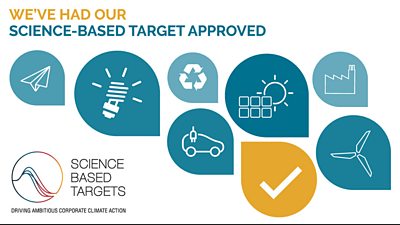�鶹Լ�� sets out path to Net Zero by 2030
The �鶹Լ�� has had its science-based targets approved by the globally-respected Science Based Targets initiative (SBTi), setting a path for the corporation to achieve its goal of net zero greenhouse gas emissions by 2030

At the start of the year we shared our ambition to reach net zero by 2030. Since then, there’s been a huge amount of work to put in place a credible and achievable plan. We are now converting that plan into action. This will be a huge collective effort. It won’t be easy, but we must act, and act now, to reduce our environmental impact.
This accreditation is an endorsement of the �鶹Լ��’s credible strategy to significantly reduce its environmental impact by the end of the current decade.
The �鶹Լ�� will pursue a ‘deep decarbonisation’ strategy to achieve net zero, a plan focussed on targeting and eliminating fossil fuel usage across its operations to drastically reduce the amount of carbon produced by the organisation.
In January this year the �鶹Լ�� confirmed it would be pursuing a strategy to reach net zero by 2030.
Details of the strategy include: switching to renewables and electric vehicles; reducing business travel; continuing to implement more sustainable production methods, such as �鶹Լ�� Studios’ use of hydrogen and battery powered generators on Winterwatch; and working collaboratively with the �鶹Լ��’s suppliers to reduce emissions within their own organisations.
The SBTi approved targets commit the �鶹Լ�� Group to reducing emissions for scope 1 and 2 - direct operations such as those from buildings and general energy use - by 46% by 2030. In addition, the �鶹Լ��’s plan is to reduce scope 3 emissions - such as business travel and those of its suppliers - by 28% over the same time frame.
In validating the �鶹Լ��’s targets, the SBTi commended the �鶹Լ��’s ambition to adhere to a 1.5°C trajectory, currently the body’s most ambitious designation available and the limit which climate scientists argue is needed to prevent the most damaging effects of climate change, as set out in the 2015 Paris Agreement.
Tim Davie, �鶹Լ�� Director-General, says: “At the start of the year we shared our ambition to reach net zero by 2030. Since then, there’s been a huge amount of work to put in place a credible and achievable plan. We are now converting that plan into action. This will be a huge collective effort. It won’t be easy, but we must act, and act now, to reduce our environmental impact.”
The �鶹Լ�� has already taken steps to reduce its environmental impact, introducing a mandatory requirement for all new �鶹Լ�� TV commissions, and recommissions, to reach albert certification from January 2022, while the �鶹Լ�� Group has aligned to Taskforce of Climate Risk Disclosures (TCFD) governance and reporting requirements.
In August the �鶹Լ�� appointed Danielle Mulder as its first Director of Sustainability tasked with directing a corporation-wide approach to sustainability and principally leading on the development and implementation of the 2030 net zero strategy.
Danielle Mulder, �鶹Լ�� Director of Sustainability, says: “We are pursuing deep decarbonisation to achieve our net zero goals as this is what the science is telling us we need to do. Our approach will be transparent while working collaboratively with our supply chain and industry partners to drive the change that’s needed.”
Christina Figueres, founder Global Optimism, UNFCCC executive secretary 2010-2016, says: “I am delighted to see the �鶹Լ�� apply the same scientific rigour to sustainability that they’ve applied in their programming and content, by adopting science based targets. Aligning to the science and demonstrating leadership by example is very welcome at this critical time.”
Notes to editors
- The �鶹Լ�� Group comprises the public arm of the �鶹Լ��, as well as �鶹Լ�� commercial subsidiaries which operate in the UK and internationally - most notably, �鶹Լ�� Studios and �鶹Լ�� Studioworks.
- The Science Based Targets initiative (SBTi) defines and promotes best practice in science-based target setting and independently assesses organisations’ targets. The SBTi is a collaboration between CDP, the United Nations Global Compact, World Resources Institute (WRI) and the World Wide Fund for Nature (WWF).
- The �鶹Լ�� continues to play an active and prominent role in the collaborative pan-industry BAFTA albert Consortium and Directorate, of which the �鶹Լ�� is a founder member, having gifted the albert carbon calculator to BAFTA a decade ago. The �鶹Լ�� is also a founder member of the albert Sports and News Consortiums, two groups set up to specifically explore and act upon the impact sports and news broadcasting has on the environment. For 20/21, all �鶹Լ�� Studios TV productions completed the albert carbon footprint with 98% managing to decrease carbon emissions; 48% of �鶹Լ�� programmes were albert certified, an increase of 14% YoY; and 93% of �鶹Լ�� programmes completed the albert carbon footprint. The �鶹Լ�� is also a part of DIMPACT, a broadcaster and academic partnership to develop an online tool that calculates the carbon footprint of actual streaming and other digital media content.
- As a net zero specialist who has worked in the sector for 15 years, Danielle joins the �鶹Լ�� having held the position of Director at Carbon Intelligence where she led a team of strategists and sustainability engineers. She has previously worked as a sustainability lead or adviser on projects including London 2012, Commonwealth Games 2018, Sydney Metro, Transport for New South Wales, Grosvenor property group, Network Rail, Aviva Investors, Yum, Burger King and Coca Cola.
- TCFD reporting requires identifying and assessing the climate-related risks and opportunities that could impact the �鶹Լ�� in the future and results in a significant change to the oversight and management of climate change impacts within the organisation.
- More information about the �鶹Լ��’s net zero strategy can be found on the �鶹Լ�� Environmental Sustainability website.
�鶹Լ�� Press Office